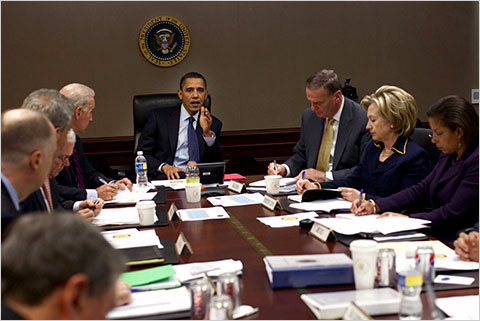
From Adam Entous, Wall Street Journal: A reconstruction of months of conversations within the administration—based on interviews with two dozen senior officials in Washington, Europe and the Middle East—suggests that process has been slowed by internal divisions, miscalculations and bureaucratic inertia. . . .
The cautious approach comes from the president himself, buttressed by advisers including Denis McDonough, now the White House chief of staff. Their view: Syria is awash in arms and adding more risks worsening violence without improving rebel chances of victory. . . .
In April, the Pentagon readied preliminary options for White House staff that included no-fly zones and limited aerial strikes, but they weren’t presented to the president.
In the weeks that followed, top White House officials met with planners at the Pentagon to discuss options, which included arming rebels without links to Islamist groups and providing them with tactical training. No option received much high-level support at the time. "Nobody could figure out what to do," a senior defense official said. . . .
The administration committee charged with Syria policy was kept on a tight leash by Mr. McDonough, then the deputy national security adviser and a close confidante to Mr. Obama, participants say. They said Mr. McDonough made clear that Mr. Obama wasn’t interested in proposals that could lead the U.S. down a slippery slope to military intervention; instead, he had the committee focus mostly on post-Assad planning.
"It was clear to all participants that this was what the White House wanted, as opposed to really focusing on key questions of how do you get to the post-Assad period," one participant said.
Administration officials said one of the reasons the committee was told to focus on post-Assad planning was because intelligence at the time created "a sense" in the White House that Mr. Assad could be killed by rebels or his own people, eliminating the need for riskier measures to support the rebel campaign.
Officials said Mr. McDonough held smaller side meetings in which officials debated whether the White House should authorize so-called "accelerants"—covert measures designed to speed Mr. Assad’s fall. Those proposals, too, met with caution at the White House, which worried it could undercut U.S. efforts to persuade Russia to halt military aid to the Syrian regime. . . .
In July, shortly after Mr. Annan’s negotiations broke down, the U.S. military’s Joint Staff began formally presenting military options to the White House. One of the no-fly zone options called for a bombing campaign followed by round-the-clock combat air patrols.
In those briefings, attendees say, Gen. Martin Dempsey, chairman of the Joint Chiefs of Staff, and other top military officials emphasized the risks, including hitting civilians: "It would look like we were carpet bombing the Syrians," said a former senior U.S. official who attended one of the briefings.
Defense officials say the Joint Staff presented the best options available. Top military commanders acknowledge they weren’t enthusiastic about the options because they didn’t see them as viable. "Some things are what we call wicked problems," one senior defense official said. . . .
The debate came to a head in an October meeting in the White House Situation Room.
[CIA Director David] Petraeus, leaning forward during his presentation, made a forceful case for arming rebels, arguing it would help the U.S. build pro-Western allies and shape future leaders of a post-Assad Syria.
[Secretary of State Hillary] Clinton spoke in favor of the initiative but her remarks were brief. U.N. Ambassador [Susan] Rice argued strongly against arming the rebels, citing doubts about the opposition. Ms. Rice through a spokeswoman declined to comment.
Other White House advisers worried that providing arms, without toppling Mr. Assad, risked making the U.S. look ineffectual. Moreover, such a move would leave the president open to attack if the arms found their way into the hands of extremists.
Shortly after the meeting, Mr. Petraeus resigned over an extramarital affair. A CIA analysis played down the impact of arming the rebels on accelerating Mr. Assad’s fall, and the proposal to arm the rebels died. (photo: Pete Souza/White House)
Image: white%20house%204%201%2013%20situation%20room.jpg
